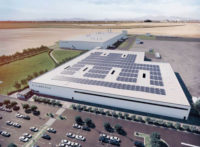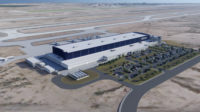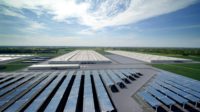ElectraMeccanica Vehicles Corp., a Vancouver, B.C.-based designer and manufacturer of electric vehicles, has selected a multi-acre factory site north of Phoenix-Mesa Gateway Airport to manufacture its three-wheeled, single-seat SOLO vehicles.
The approximately 235,000-sq-ft building is the company’s first U.S.-based assembly facility and engineering technical center. Scheduled to be fully operational in March 2022, the plant will begin manufacturing SOLOs later that year, producing as many as 20,000 vehicles annually and generating up to 500 jobs for the Mesa-Phoenix area, says CEO Paul Rivera.
The announcement follows the building of two other EV factories, south of Mesa in Pinal County. Silicon Valley-based Lucid Motors has begun manufacturing pre-production versions of its high-performance luxury Air cars in Casa Grande, and in Coolidge, Phoenix-based Nikola Corp. will complete the first phase of its heavy trucks factory by the fourth quarter of this year.
Rivera explains the company chose Arizona based on the “best overall comprehensive proposal—land, building and workforce,” as well as proximity to the prime West Coast EV market.
This is ElectraMeccanica’s second facility. In China, manufacturing partner Zongshen Industrial Group will supply kits for assembly in Mesa before the factory begins production.
ElectraMeccanica expects to begin staffing in Mesa within the next few months and will soon announce the general contractor, architect and remaining construction team as well as construction specifics, Rivera says.
A Wide Arizona Road Into the Future
In Casa Grande, the 999,000-sq-ft Lucid Motors factory is the first greenfield, dedicated electric-vehicle factory to be built in North America, says Andrew Hussey, the company’s communications director. The 590-acre AMP-1 (Advanced Manufacturing Plant) site has completed the first of four phases, and the campus will eventually total 5.1 million sq ft at 2028 build-out. The second phase begins in the second quarter this year, and the company’s Project Gravity SUV will begin production in 2023.
In Coolidge, Nikola Motors is nearing completion of its first-phase 270,000-sq-ft building. “It should be fundamentally completed by May of this year, and we’re hoping to start assembling trucks there this summer,” says Mark Duchesne, the company’s global head of manufacturing. Detroit-based Walbridge is the general contractor for the $600-million project (total cost).
In Flagstaff, UACJ-Whitehall Industries will occupy as much as 70,000 sq ft of the 379,000-sq-ft former distribution center. A division of Japanese aluminum company UACJ Corp., the U.S. firm supplies precision extruded-aluminum automotive components and assemblies.
Gail Jackson, president and CEO of the Economic Collaborative of Northern Arizona, the regional economic development organization of northern Arizona, says that UACJ Whitehall plans to invest as much as $60 million in the area and expects to begin operations and start hiring in April.
Is Arizona EV Ready?
Approximately 1.7 million EVs are being driven in the United States, 35,000 of those in Arizona. By comparison, neighboring California has about 700,000 electric vehicles on its roads, according to figures provided to Arizona Public Service Co. in July 2020 by the Electric Power Research Institute.
“Over the next 10 years, the number of registered electric vehicles is expected to have vast growth, as more drivers take advantage of the benefits of electric transportation,” says Kathy Knoop, APS energy innovation adviser.
Based on a 2019 transportation electrification analysis done by Tempe-based Salt River Project, nearly 100,000 EVs are projected to operate in its service territory by 2025, explains Catherine O’Brien, electric vehicle lead at SRP, the Phoenix metropolitan area’s largest electricity supplier and Arizona’s largest supplier of water.
As a result, the state, municipalities, utilities and industry are working to eliminate concerns such as range or fuel anxiety by increasing the number of public-charging stations and decreasing barriers to implementing this type of infrastructure.
Arizona has 753 public-charging stations as of March 17, with 499 of these in the Phoenix metropolitan area, O’Brien says, citing figures from Portland, Ore.-based Chargeway. The company provides an EV-charging-station database and an EV app so that customers can easily understand how and where electric cars are charged.
“Arizona has expanded its highway fast-charging infrastructure in the last 12–24 months through efforts by networks such as Electrify America and Tesla, but more high-power charging stations will be needed to fully satisfy statewide travel in electric vehicles,” says Matt Teske, founder/CEO for Chargeway, noting that in Phoenix the average fast charge time is still about an hour to get back on the road.
And, in a 2020 survey done with SRP’s EV community members—those in its service area driving EVs—SRP found that only 13% believe that public charging is adequate in the region.
By 2035, SRP plans to reduce the amount of carbon dioxide emitted per megawatt-hour by 65% from 2005 levels and 90% by fiscal year 2050. Also by 2035, SRP is committed to enabling 500,000 EVs operating in its service territory while managing 90% of EV charging there. To do this, SRP provides a number of incentives and rebate programs to business and residential customers.
Through a variety of initiatives, APS also is supporting drivers who have switched to electric vehicles by investing in the installation and maintenance of Level 2 charging stations.
Daniel Haughton, the utility’s director of Customer to Grid Solutions says: “Through programs such as Take Charge AZ, we’re engaging in local partnerships with the community to help meet the charging needs of EV drivers and provide solutions that enhance their experience on our state’s roads.”





Post a comment to this article
Report Abusive Comment